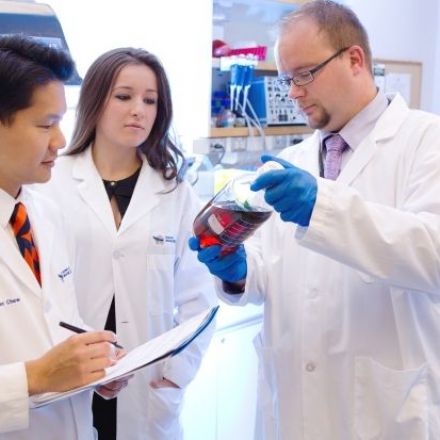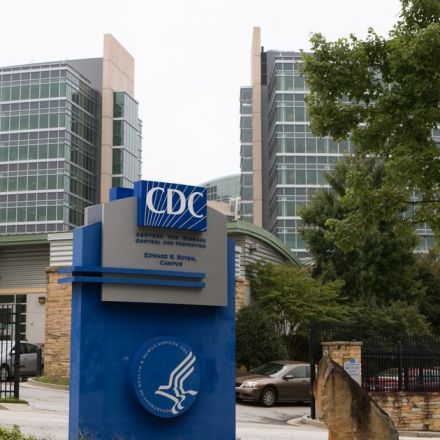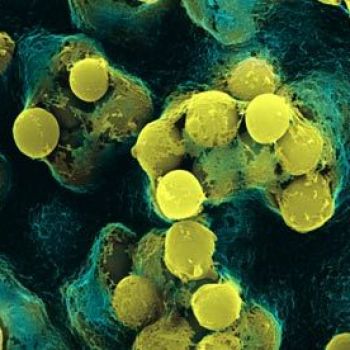

10 years ago
12
VGH researchers try to unravel role of gut bacteria in kidney stones
Researchers at Vancouver General Hospital are using genetic sequencing of microbes in stool samples to try to determine if specific gut flora can help prevent kidney stones.
Continue Reading
Additional Contributions:



























Join the Discussion
I hope somebody figures this out, in my lifetime. I have at least a couple episodes a year, even after following the recommended diet. I've had 3 times that they wouldn't pass and had to be broken up. Not fun.
My best friend is hospitalized at least once a year with kidney stones. I've had to take her once. It's scary watching from the outside, but I can't even imagine what it is like to have them and the pain that goes along with it.
The rate at which we are messing with genetic sequencing is both exciting and frightening. On one hand, I am extremely excited to find cures/fixes/etc. for common ailments that are non-life-threatening and perhaps more on the "easy" (as if genetic sequencing was easy!) side of of the coin.
I just got a kidney stone October of last year and it was horrifying. I woke up and thought I was dreaming the pain and couldn't make it to the bathroom before I started screaming in pain. My landlords noticed and were kind enough to drive me to the hospital, but it was awful. I didn't get a ureteral stent in for one week (and a stent reduces the intensity of pain by allowing fluid to travel from the blocked kidney down to the bladder) and during that week I just had to get used to letting out my screams into a pillow when the stone shifted every few hours.
The research VGH is doing is very interesting, but my concern is that flora won't be a direct treatment. They mention that they believe obesity correlates with kidney stones - and it also correlates with gut flora. So now we have three conditions tied to gut flora, which is further tied to diet. I wonder if they'll find that certain gut flora are decreased by diets that also correlate with kidney stones, rather than finding a particular flora that will treat kidney stones (if that makes sense).
Do you know what type of stone yours was? My friend has stones that are extremely high in uric acid and look like jagged, sharp, and pointy rocks. Painfully so. (We both worked together in the medical field ... so microscope!) The doctor's had her change her diet to avoid foods with uric acid and other things, and at first it seemed to be working, but then, either she went off the diet (she denies) or it really wasn't working in the first place. Also she's skinny, so obesity isn't a factor. Last year she had one start just before my daughter's birthday party (bless her heart she still came but couldn't hardly move), and it's coming up on that time of year again - so I'm waiting for the text that says another has come.
But I wonder if the research is only targeting more calcium based stones or uric acid based stones, or the other types.
I have no idea what kind my stone was. I think my surgeon was ready to be rid of me due to the scheduling error on his part being a little embarrassing. None of the doctors recommended any changes or gave me a suspected cause for my stone, so I wonder if that's because it was one type of stone or another. My suspicion is that my stone was brought about by some very rapid weight loss on my part along with poor hydration.
The research page that mentions the study doesn't say whether they're looking at specific types of stones or just all stones in general.
Edit: I recalled that my kidney stone was never visible on fluoroscope/x-ray and so it was most likely a uric acid stone.
IIRC, about 80% of stones are calcium based. I would bet that's where they are targeting research. They gave me a pretty restrictive diet, and it has slowed down the formation of stones. Used to pass about one a month, now it's one every 3-4 months. With no dairy, no calcium intake whatsoever, no vitamin D, I see osteoporosis in my future.
Oh no! That sounds horrific. I've known two people who have had them. One described the experience as :"Trying to pass a bowling ball through a straw." I had to look up "Ureteral stent"..Holy cow!
It's said that the pain is as close as a man will come to experiencing childbirth. The only worse pain I've ever experienced was cluster headaches. When I get a stone that's reluctant to pass, I remember that it can get (slightly) worse.
Just reading your comment gave me cold sweats. I had a large kidney stone that they didn't get the first time around with surgery (and not the shockwave kind) then had to wait four months for them to actually get it due to a scheduling area. Those four months were some of the worst of my life between the stone, the pain meds, and the ureteral stent (especially the stent). I'm really hoping it was just a one-time thing.
I hope they gave you the really good drugs. Longest I had to go was 10 days, can't imagine 4 months of that.
It was brutal. My daily pain regimen involved 4 Advil, 2 Tylenol, and 1 Aleve every 4-6 hours as needed (and it was needed) plus 5-10mg morphine or Dilaudid (can't remember the dosage for the dilaudid) basically no more than every 6 hours, though I tried to really minimize using those ones. In Canada we can get T1s (Tylenol with a small amount of codeine) over the counter, so I tried to use those instead of the morphine/Dilaudid as much as possible.
tl;dr - yes, I think I ingested some good drugs ;)
I've only ever gotten Dilaudid in the ER (Good stuff). Usually demerol or percocet for the take home prizes.